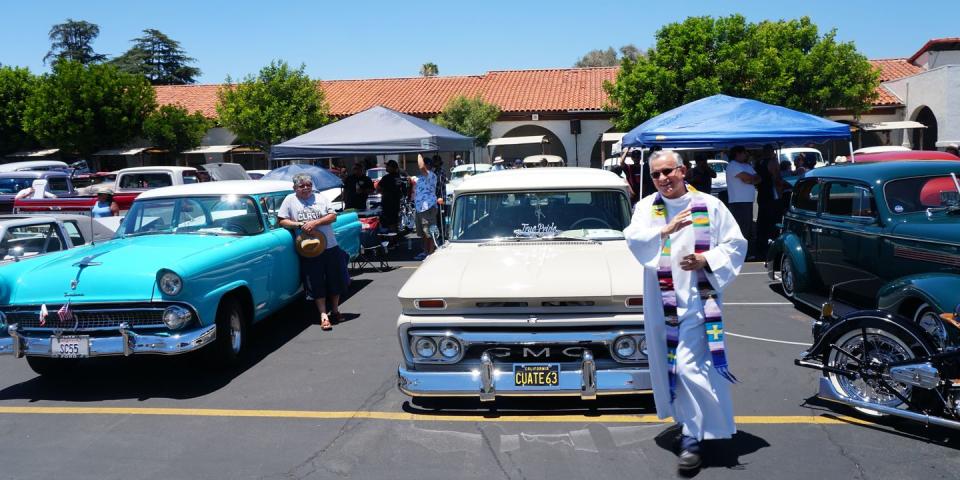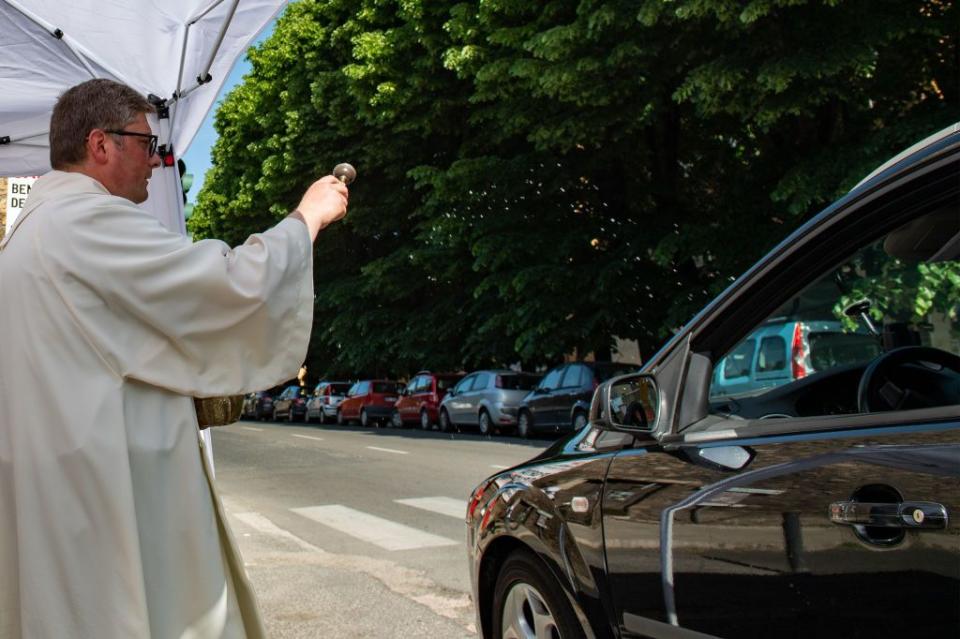Can God Keep You Safe on the Road?

We like to steer clear of religion and politics on this website—or at least steer clear of them most of the time. Surely one story about the Blessing of the Cars couldn’t hurt, could it?
Seeking divine intervention in auto safety is not something for which AAA offers a discount. Nor does Hagerty, Mercury, Allstate, State Farm, or 21st Century.
“California auto insurance is heavily regulated,” said AAA’s Doug Shupe. “Carriers can only use a set of prescribed rating factors approved by the California Department of Insurance. Having your vehicle blessed is not on that list…”
It’s not something that pencils out, mathematically speaking, as helpful when it comes to distracted driving or any of the major causes of accidents and insurance payouts.
Yet, the idea of having a priest, rabbi, imam, or other religious leader dispense a divine blessing on your motorcar is done around the world and in just about every religion. I first read about it in a Nigerian car magazine that asked the question, “Will Voodoo Keep You Safer on the Road?” The answer was, essentially, “Maybe, but still pay attention when you drive.”
At the time I didn’t know anything about Voodoo, but have since learned that there are many commonalities between it and my own Roman Catholic upbringing. For instance, both religions believe in the intercession of saints and angels, and both offer blessing of the cars.
The latter practice is often seen as part of a Catholic rite here in the United States. Both the San Gabriel, California, Mission church and the Carmel Mission Basilica in Carmel offer blessings, for instance, both in conjunction with car shows. But you can get your car blessed in just about any part of the world.
Mike Brewer from the TV show Wheeler Dealers: Trading Up, can be seen in one episode getting his car blessed by a holy man in India. The man uses orange paint to mark the intake cover, then hands Mike a coconut and some flowers, which Mike holds over the engine whilst the holy man says, “Whether pure or impure, or having passed through all conditions of material life, one who remembers lotus-eyed Krishna becomes externally and internally clean.” He then gives Brewer a “very nice biscuit,” which Brewer eats.
A story at nexus media news describes an event at which “Interfaith Leaders Bless Electric Vehicles.” Several clergy from different faiths participated in the blessing at Mt. Olivet Baptist Church in Newark, New Jersey.
“It may sound unusual, but many faiths have ceremonies for blessing a vehicle,” wrote nexus media’s Owen Agnew. “In Hinduism, a puja ceremony is often performed when buying a new car. The Catholic Church has an official blessing for automobiles. The blessing at Mt. Olivet was interfaith, with several Baptist ministers, an imam, and Rabbi Abraham in attendance. They all spoke about electric vehicles not just as objects to be blessed, but as tools for carrying out the larger spiritual missions of those faiths.”
“The book of Genesis gives us a job,” Rabbi Abraham is quoted in the article. “We are stewards of this earth. It is our job to take responsibility for this planet.” Electric cars, Abraham said, can help us protect the Earth for future generations.
For Imam Saffet Catovic, who also spoke at the event, the importance of electric vehicles follows logically from a verse in the Koran. “‘The servants of the merciful are those who walk upon the earth softly,” Catovic said. “Commitment to walking upon the earth softly means reducing our carbon footprint.”

But that strays a little from our topic on the Blessing of the Cars.
My friend Sophie was raised in a home that combined Hinduism with Unitarian/Universalist beliefs. She studied Biblical Hebrew at Cambridge for two years while contemplating rabbinical studies but switched to biology and is now aiming toward a medical degree. So she said she can’t really be an expert—but then, who is?
“There are car mezuzahs’ available—a version of the scroll that some Jews have at the entrance to their home and I’ve met a couple of people who have them hanging from the rearview mirror for protection—but as I understand it the matter is hotly debated. The debate centers on whether mezuzahs are only for dwellings (consensus is yes), whether cars count as dwellings, and whether it’s OK to hang them.”
Being an academic, she did some further research.
“On Googling, I found online sources advising observant Jews to say a blessing when they buy a new car. But that blessing is used for a number of things, including other major purchases and seeing particular fruits, so it’s not car-specific, and the purpose is more to thank God for the car than to ensure safe passage in the car.”
My friend Jeff, a devout Jew, said simply, “I’ve never heard of anything like that.”
My friend Ram, short for Ramakrishna, was raised in the Hindu faith and still practices it.
“When I was a kid, some Indian friends of my family got a new car. They put lemons under each tire, and drove over them,” he said without elaboration. “It’s common for Hindus to put a small Ganesh statue on the dashboard. Ganesh is the god who removes obstacles.”
That makes sense.

Vaishali A. Patel wrote on the website Sanskar Teaching exactly how to perform a Car Pooja (her spelling of Puja). You’ll need: 4 lemons, 1 coconut, incense, rice, and a small statue of Ganesh. You put the four lemons under the tires, put five small dots of kanku powder on the car and chant, “Om gam ganapatye namah.” Then break open the coconut and spread the coconut milk on the outside and inside of the car.
“Many Hindus around the world perform this ceremony to bless the vehicle that will take them safely from one place to another,” said Patel.

My friend Zi Hao was raised in a home with the Buddhist faith.
“My family loosely follows Buddhism,” Zi Hao told me. “We knocked a grapefruit branch and leaves on the wheels of our new Tesla. I would say it’s kind of like a blessing of the car, but it’s more superstition than anything.”
Zi Hao later called back with clarification.
“The tree was actually a pomelo tree native to Southeast Asia. The Chinese characters for pomelo can be a play on words for ‘rolling.’ So for good luck you get the leaves of the pomelo tree and gently rub it on the tires of your new car.”
Seems as good as any such blessing.
My friend Lara is a former Unitarian who loves getting questions like these.
“So are we talking about official blessings by priests, or just the religious figurine on the dashboard? Or dangling from the rear-view mirror? ‘Cause let me tell you some of the things I’ve seen...”
She has lived around the world and seen a lot.

“Buddhists in Singapore keep either little Buddhas or solar-powered prayer wheels on the dashboard. Did I give your family a solar powered prayer wheel? (She did.) If I did it’s probably on the kitchen windowsill, generating merit. (It is.)
“Sikhs have images of Guru Nanak (the founder of Sikhism) dangling from the mirror.
“I’m amazed by the Blessing of the Cars—I know some priests had a lot of trouble with the idea that animals had souls and that it would thus be OK to bless pets, but has the Vatican ruled on whether cars have souls? (No.) Can you bless something that doesn’t have a soul? My spider sense detects some inconsistencies here.”
So does a blessing actually work to prevent accidents? Not according to insurance companies that would actually pay out fewer premiums if blessings worked. I found no scientific study analyzing whether blessing a car kept it safer.
But surely it eases some anxiety? Maybe. And is that necessarily a bad thing? For the definitive answer to this question and to all of life’s questions, read the comments section below.

 Yahoo Autos
Yahoo Autos 